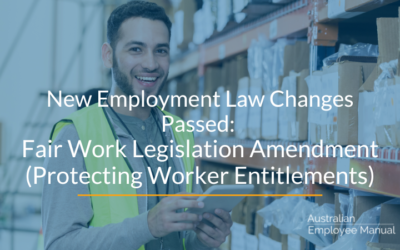Australia’s employment landscape is undergoing significant changes with the recent passage of the Fair Work Legislation Amendment (Closing Loopholes No. 2) Bill 2024. This post provides an overview of key amendments impacting small businesses, covering casual employment, the right to disconnect, the definition of employment, and other critical updates.
The latest changes to Australia’s employment laws were passed by both Houses of Parliament on 12 February 2024.
Royal Assent is required before these changes become law. Once Royal Assent has occurred, then we will issue updates to our Employee Manual suite of products.
Royal Assent is taking longer than usual. This is possibly because there is an additional change, the Fair Work Amendment Bill 2024, before Parliament. This change seeks to amend the newly passed Right to Disconnect to rule out criminal penalties for breaches of this section.
Once that passes through both Houses of Parliament, we can only assume that Royal Assent will quickly follow. Until then, these changes are all on hold.
Update: Royal Assent occurred 26 February 2024, so the changes take effect from that date.
Casual Employment Key Changes
Starts 6 months after Royal Assent.
New Definition of Casual Employee
The Act introduces a new definition of casual employee, based on the absence of a firm advance commitment to continuing and indefinite work, and where the employee is entitled to a casual loading or a specific rate of pay for casual employees (under a fair work instrument or contract).
The Act includes several factors to consider when assessing if there is a ‘firm advance commitment’, including:
- having regard to the ‘real substance, practical reality, and true nature of the relationship,
- having a contract stating the employment is as a casual,
- the mutual understanding or expectation between the employer and employee,
- an inability of the employer to elect to offer work or an inability of the employee to accept or reject work (and whether that occurs in practice),
- whether it is reasonably likely that there will be future availability of continuing work in the business,
- whether there are full-time and part-time employees performing the same or similar work,
- whether there is a regular pattern of work for the employee.
Casual Conversion Process Changes
The casual conversion process to full or part-time employment has been changed and is now initiated by the employee after 6 months of employment (12 months for small businesses with fewer than 15 employees).
This new process is now driven by the employee through giving a notification to their employer that they wish to convert to full time or part time employment.
The employer will then review the application and respond to the application, the grounds for refusal have been broadened to include ‘fair and reasonable operational grounds’.
There is some guidance on what this might mean in practice (e.g. broadly, it would be fair and reasonable to not accept a request if substantial changes would be required to the way in which work is organised; there would be significant impacts on the operation of the employer’s enterprise or substantial changes to the employee’s terms and conditions would be reasonably necessary to ensure the employer does not contravene a term of a fair work instrument that would apply to the employee as a full-time employee or part-time employee).
Casual Employment Information Statement (CEIS) Changes
With the changes to casual conversion, the frequency of supplying Casual Employment Information Statements has changed.
The new Casual Employment Information Statements timetable: Employers must give casual employees a copy of the CEIS:
- Before or as soon as practical after a casual employee starts with a business, and
- Another copy 6 months after the casual employee starts with a business (12 months if it is a small business), and
- Another copy at the end of every 12 months of employment with the business. (This does not apply if the business is a small business).
Right To Disconnect
Starts 6 months after Royal Assent (12 months for small business employers with fewer than 15 employees).
Australia is the most recent in a long line of countries with Right to Disconnect requirements including France (where the concept originated), Belgium, Italy, Spain. Slovakia, Canada, Kenya, Germany, and Argentina.
The right to disconnect is a new workplace right that prevents employees from being penalised for refusing to take unreasonable work calls or answer emails during their unpaid personal time.
This right aims to protect employees from excessive or intrusive work demands that may affect their health, wellbeing, and work-life balance.
Employees can raise complaints about intrusive phone calls or out-of-hours work emails with their employer.
If the issue remains unresolved at the workplace level, employees can apply to the Fair Work Commission for an order to stop unreasonable out-of-hours contact.
The new right applies to all employees, except in cases where the person being contacted is paid to be on-call or their job description requires it.
Emergency situations or changes to work conditions (such as location, hours, or availability to cover shifts) are also considered reasonable contact.
Definition Of Employment –
Starts 6 months after Royal Assent, or earlier by proclamation.
The changes to the definition of employment are designed to address the issue of sham contracting, where workers are falsely classified as independent contractors and denied their rights and protections as employees.
A new definition of employment is included, that covers any person who performs work or services for another person under a contract, unless the person is genuinely carrying on a business of their own.
The Act has reinstated the multi-factorial test previously applied by courts and Industrial Tribunals, but which were overturned by recent High Court of Australia rulings.
The Act now specifies that the employment relationship should be determined by the real substance, practical reality and true nature of the relationship, rather than the formal terms of the contract.
The proposal also lists some factors that can be considered in assessing the employment relationship, such as the ability to accept or reject work, the nature of the employer’s enterprise, the existence of full-time and part-time employees performing the same work, and the regularity of the work pattern.
Sham Arrangements
Starts the day after Royal Assent.
New provisions have been introduced to strengthen the enforcement and deterrence of sham arrangements.
Sham arrangements are when an employer misrepresents an employment relationship as an independent contracting arrangement or disguises an ongoing employment relationship as a series of separate contracts.
Gig Economy Workers
Starts 6 months after Royal Assent, or earlier by proclamation.
The Act amendments will allow individuals and organisations to apply to the Fair Work Commission for orders related to minimum standards to gig economy workers. This covers employees in the road transport industry such as food delivery drivers, and more broadly gig economy workers such as digital platform workers.
These changes are designed to ensure that gig economy workers receive the same benefits and fundamental rights as other workers.
These standards are intended to cover aspects like pay, penalty rates, superannuation, payment terms, record-keeping, insurance, and deactivation (removing gig economy workers from platforms).
Multi-Enterprise Agreements
Starts the day after Royal Assent.
The Act allows multiple employers that are franchisees of the same franchisor to make a single-enterprise agreement, rather than a multi-enterprise agreement, with their employees.
Transitioning From Multi-Enterprise Agreements
Starts the day after Royal Assent.
The Act provides that a single interest employer agreement or a supported bargaining agreement ceases to apply to an employee when a single-enterprise agreement that covers the same employee comes into operation.
Workplace Delegates
Starts 6 months after Royal Assent, or earlier by proclamation.
The Act makes some changes to the rights of workplace delegates, mainly for regulated businesses (typically relating to road transport).
In addition, it now requires that modern awards, enterprise agreements and workplace determinations include a delegates’ rights term, which provides for the exercise of the rights of workplace delegates.
Penalties
Starts the day after Royal Assent.
Civil penalties for various contraventions, such as those relating to contravening national employment standards, modern awards, enterprise agreements, minimum wage orders, wage underpayments etc, have been significantly increased.
Other Changes To Watch Out For
The Paid Parental Leave Amendment (More Support for Working Families) Bill 2023 is currently before the Senate, and seeks to increase the maximum period of flexible paid parental leave by 2 weeks each year from 1 July 2024 to 26 weeks from 1 July 2026; increase the reserved period for partnered claimants by one week each year from 1 July 2025 to 4 weeks from 1 July 2026; and increase the number of days that can be taken concurrently by multiple claimants to 4 weeks by 1 July 2025.
We will keep you updated when this is approved through Parliament.



